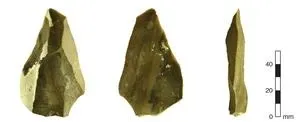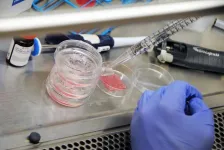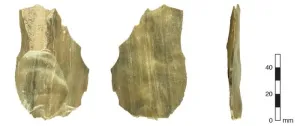(Press-News.org) First fully peer-reviewed, indexed study to look at link between strict vegetarianism and genetics
More people would like to be vegetarian than actually are. ‘We think it’s because there is something hard-wired here that people may be missing’
Findings open the door to further studies that could have important implications regarding dietary recommendations and the production of meat substitutes
CHICAGO --- From Impossible Burger to “Meatless Mondays,” going meat-free is certainly in vogue. But a person’s genetic makeup plays a role in determining whether they can stick to a strict vegetarian diet, a new Northwestern Medicine study has found.
The findings open the door to further studies that could have important implications regarding dietary recommendations and the production of meat substitutes.
“Are all humans capable of subsisting long term on a strict vegetarian diet? This is a question that has not been seriously studied,”said corresponding study author Dr. Nabeel Yaseen, professor emeritus of pathology at Northwestern University Feinberg School of Medicine.
A large proportion (about 48 to 64%) of self-identified “vegetarians” report eating fish, poultry and/or red meat, which Yaseen said suggests environmental or biological constraints override the desire to adhere to a vegetarian diet.
“It seems there are more people who would like to be vegetarian than actually are, and we think it’s because there is something hard-wired here that people may be missing.”
Several genes involved in lipid metabolism, brain function
To determine whether genetics contribute to one’s ability to adhere to a vegetarian diet, the scientists compared UK Biobank genetic data from 5,324 strict vegetarians (consuming no fish, poultry or red meat) to 329,455 controls. All study participants were white Caucasian to attain a homogeneous sample and avoid confounding by ethnicity.
The study identified three genes that are significantly associated with vegetarianism and another 31 genes that are potentially associated. Several of these genes, including two of the top three (NPC1 and RMC1), are involved in lipid (fat) metabolism and/or brain function, the study found.
“One area in which plant products differ from meat is complex lipids,” Yaseen said. “My speculation is there may be lipid component(s) present in meat that some people need. And maybe people whose genetics favor vegetarianism are able to synthesize these components endogenously. However, at this time, this is mere speculation and much more work needs to be done to understand the physiology of vegetarianism.”
The study will be published Oct. 4 in the journal PLOS ONE*. It is the first fully peer-reviewed and indexed study to look at the association between genetics and strict vegetarianism.
Why do most people eat meat?
Religious and moral considerations have been major motivations behind adopting a vegetarian diet, and recent research has provided evidence for its health benefits. And although vegetarianism is increasing in popularity, vegetarians remain a small minority of people worldwide. For example, in the U.S., vegetarians comprise approximately 3 to 4% of the population. In the U.K., 2.3% of adults and 1.9% of children are vegetarian.
This raises the question of why most people still prefer to eat meat products. The driving factor for food and drink preference is not just taste, but also how an individual’s body metabolizes it, Yaseen said. For example, when trying alcohol or coffee for the first time, most people would not find them pleasurable, but over time, one develops a taste because of how alcohol or caffeine makes them feel.
“I think with meat, there’s something similar,” Yaseen said. “Perhaps you have a certain component — I’m speculating a lipid component — that makes you need it and crave it.”
If genetics influence whether someone chooses to be a vegetarian, what does that mean for those who don’t eat meat for religious or moral reasons?
“While religious and moral considerations certainly play a major role in the motivation to adopt a vegetarian diet, our data suggest that the ability to adhere to such a diet is constrained by genetics,” Yaseen said. “We hope that future studies will lead to a better understanding of the physiologic differences between vegetarians and non-vegetarians, thus enabling us to provide personalized dietary recommendations and to produce better meat substitutes.”
The study, titled “Genetics of Vegetarianism: A Genome-Wide Association Study,” was conducted in collaboration with scientists from Washington University in St. Louis and Edinburgh, United Kingdom.
*Link will go live after embargo has lifted.
END
What if a vaccine, given to patients just before or after arriving at the hospital, could protect them against lethal superbugs that lurk in healthcare settings?
That’s the premise behind an experimental vaccine invented by a USC-led team and patented by the university. Researchers designed the formula to prevent serious infections from drug-resistant pathogens. A new study shows that a single dose, administered in mouse models, put immune cells into "Incredible Hulk" mode, providing rapid protection against eight different bacteria and fungi species.
“It’s an early warning system. ...
WINSTON-SALEM, NC – October 4, 2023 - A research paper published today in Science Translational Medicine presents a significant breakthrough in the area of skin regeneration and wound healing by researchers at the Wake Forest Institute for Regenerative Medicine (WFIRM). The study, titled "Bioprinted Skin with Multiple Cell Types Promotes Skin Regeneration, Vascularization, and Epidermal Rete Ridge Formation in Full-Thickness Wounds," shows the successful development of bioprinted skin that ...
In recent years, studies have revealed that the now-arid region of northern Arabia was once much wetter and greener, providing Neolithic human populations with access to both water and game. The present aridity of the region, however, preserves little organic matter, making a reconstruction of the Neolithic lifestyle difficult.
Now, in a new study published in the journal PLOS ONE, researchers from the Max Planck Institute of Geoanthropology, the National Research Council of Italy, Institute of Heritage Science (CNR ISPC), and University College London present use-wear ...
An international team of scientists has found early human migrants left Africa for Eurasia, across the Sinai peninsula and on through Jordan, over 80-thousand years ago.
Researchers from the University of Southampton (UK) and Shantou University (China), together with colleagues in Jordan, Australia and the Czech Republic(1), have proved there was a “well-watered corridor” which funnelled hunter-gatherers through The Levant towards western Asia and northern Arabia via Jordan.
Their findings, published in the journal Science Advances, support previous research conducted ...
EMBARGOED FOR USE UNTIL:
2 p.m. (ET) on Oct. 4, 2023
--
A UCLA-led team of researchers has found nerve pathways that supply brown adipose tissue (BAT), a type of tissue that releases chemical energy from fat metabolism as heat – a finding that could pave the way toward using it to treat obesity and related metabolic conditions.
The researchers have for the first time detailed this nerve supply and provided examples of how manipulating it can change BAT activity, marking a first step toward understanding how to use it therapeutically, said ...
To date it has been unclear exactly how the sex of a bee is determined. A research team from Heinrich Heine University Düsseldorf (HHU) comprising biologists and chemists has now identified a key gene and the molecular mechanism linked with it. In the current issue of the scientific journal Science Advances, they describe how this process is similar to a game involving two dice.
The sex of a living creature has significant consequences for its form, function and behaviour. The biological sex of an organism is usually determined at the start of its life. In humans, for example, the presence of the sex-determining “Y chromosome” ...
WASHINGTON, DC – The Department of Energy’s (DOE’s) Office of Science has selected 60 graduate students representing 26 states for the Office of Science Graduate Student Research (SCGSR) program’s 2023 Solicitation 1 cycle. Through world-class training and access to state-of-the-art facilities and resources at DOE National Laboratories, SCGSR prepares graduate students to enter jobs of critical importance to the DOE mission and secures our national position at the forefront of discovery and innovation.
“This ...
NEW YORK (October 4, 2023) -- The Brain & Behavior Research Foundation today announced that Special Olympics International is the recipient of the 2023 Pardes Humanitarian Prize in Mental Health. It is recognized for its lasting humanitarian impact around the world through sports training and athletic competition for adults and children with intellectual disabilities.
An Honorary Pardes Prize Recipient was also announced for 2023 – Henry Jarecki, M.D – for his important contributions to the field of psychiatry and his unique work to preserve academic and scientific freedom.
“Special Olympics International is being honored as a beacon of light ...
ROCHESTER, Minn. — Mayo Clinic researchers have developed a calculation that can help identify moderate aortic stenosis patients at higher risk of dying from the condition. According to new research published in Mayo Clinic Proceedings, calculating the patient's mean arterial pressure (AugMAP) is a simple and effective way to identify those patients who may benefit from more aggressive treatment strategies.
"Physiologically, AugMAP can be considered a marker of global left ventricular contractile function," says Chieh-Ju Chao, M.D., senior associate consultant in the Mayo Clinic Department ...
Applying machine learning to find the properties of atomic pieces of geometry shows how AI has the power to accelerate discoveries in maths.
Mathematicians from Imperial College London and the University of Nottingham have, for the first time, used machine learning to expand and accelerate work identifying ‘atomic shapes’ that form the basic pieces of geometry in higher dimensions. Their findings have been published in Nature Communications.
The way they used artificial intelligence, in the form of machine learning, could transform how maths is done, say the authors. Dr Alexander Kasprzyk from ...








